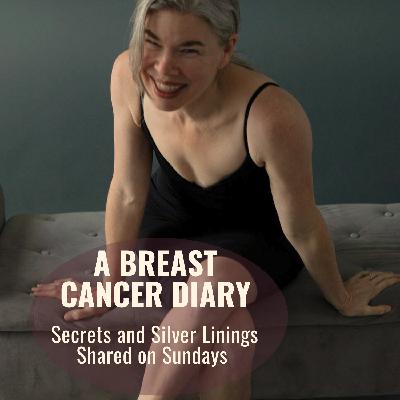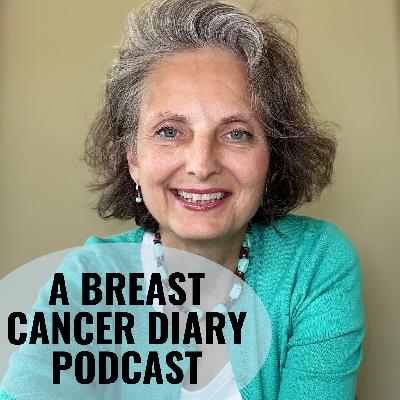Reflecting on Integrative Oncology
Description
Just a quick episode reflecting on Heather's story and the difference between "functional" or "integrative medicine" and "alternative" medicine.
Subscribe on: APPLE PODCASTS - SPOTIFY
Join my Newsletter List here:
https://abreastcancerdiary.substack.com
Heather's web site is: https://heatherjose.com/
and her podcast is here on YouTube at: https://www.youtube.com/@ImStillHereCancer/videos
Kathleen does zoom based peer navigation/mentoring sessions now. Schedule a session here for a sliding scale of $35 to $95 per hour long session: https://kathleenmoss.simplybook.me/
Transcript:
Those of you listening on the day that this episode is released, happy Easter to you if you celebrate Easter. I'm just here again just me reflecting on some of the things we talked about in the last episode with my guest, Heather Jose. Her episode was packed full of controversial issues and I'm just gonna cover a couple of them today.
And also wanted to give you a heads up that I may not be putting out episodes in the next couple of weeks. I've had a couple of guests cancel and have to reschedule, and then my dad just passed away this last week, and so I'm not able to reschedule with them soon. I do still intend to put out, um. Maybe three or four or more episodes before I take a break for the summer though.
So I will be back at some point probably in May and not in April. Um, but don't worry, I haven't finished this season quite yet. So just to get back to last week's episode and some of the topics discussed with Heather, I wanted to talk about her complimentary or integrative, uh, approach to her oncology, the fact that she worked in tandem with both the conventional system and the lifestyle medicine system.
This can be really confusing for folks who aren't familiar with. The world of functional medicine or even nature paths. There are so many different types of cancer experts, so-called experts in the world, and some of them are, are highly, you know, board certified and backed up with lots and lots of education and others of them may not be.
All of them claim to have some interest in some kind of research, or usually they do, but not all of them have really solid research behind their practices, and so this can be really confusing and really expensive and kind of scary for the typical patient to explore. I have a background, personally,
I'm a functional nutritionist, so I have a lot of experience with telling these kinds of schools of thought apart. And unfortunately in cancer there's a lot of quackery. I think there always has been. Throughout history with cancer. There's a lot of, um, people making false claims or really, really naive claims without a lot of research behind them.
And this. Movie that we talked about that Heather and I were talking about briefly in the last episode that just came out on Netflix recently called Apple Cider Vinegar is a really good example of a couple of different really scary elements, um, in this kind of shady practice. In the movie Apple Cider Vinegar, which I'm not sure if you'll be able to watch as a cancer patient. For me, it was excruciating. It took me a couple of months to get through this very short series of episodes because it was just so painful and uncomfortable and cringey for me to watch. Just, just a really unfortunate story that seems to be somewhat true, um, that takes place in Australia.
But, uh, there were two elements that were disturbing. One was that this one character in, in the film, which the film kind of was focused on, was completely lying. She was a sociopath and coming up with dietary measures for people to fix or. Cure their cancer through As someone who had never had cancer and was claiming to have cured her own cancer, that really never existed.
Of course, that is a bizarre and disturbing story to watch for anyone. I. But then there were a couple of other characters in the movie that were kind of,, carrying on a claim for themselves, and they did have cancer. they were looking into all the alternative to conventional medicine options that were out there in the world.
There were things in Mexico and South America and, um, different in indigenous practices and. , it didn't go into all the details of all of them, but the really poignant part of the story was the death of, of one woman who became kind of a thought leader and influencer of other cancer patients. And all the while her cancer had been progressing and she was denying that.
And, it's a really good wake up call for those who are seeking the alternative kind of solution to cancer in in our world right now. I think we need to have that kind of sobering reality brought to us every once in a while, and yet people like my guest, Heather Jose, do feel like lifestyle changes, diet and exercise and stress.
Related and sleep related changes in their lifestyle have made all the difference. So there is, there is something to the lifestyle end of things. And I think for me anyway, in my, in my research and my exploration, I have found that functional medicine is the best kind of mediator of the two, um, of natural and integrative and complimentary medicine.
Approach to cancer as well as medical, conventional medical, because most functional doctors are actually MDs. They're, they're fully trained in the conventional system, and then they go beyond that to get trained in the lifestyle medicine, complementary or integrative, depending on what. Label you wanna choose, and the difference is that they look for the root cause
so they're going back to the origins of the disease, which only makes perfect sense to you if you're a scientist like it. It would make sense to most people who are scientifically minded and Dr. Block. My impression is, um, when Heather went to Dr. Block in, um, Illinois, that he is one of those functional type doctors.
He is an MD so he is certainly a, a full fledged oncologist, but he's also looking into some of the other ways to compliment that with natural and lifestyle approaches. And I'm really hoping myself that he does not get shoved under the bus as we are watching films like apple cider vinegar, uh, because there are very few people like him that bridge that nicely, that really embrace both sides of the continuum.
And I think that is where the most hope lies personally. Um, I've talked a little bit about my enthusiasm for exercise oncology. As a nutritionist, I have seen literature. Across the board with nutrition and it is really messy. It's really hard to establish whether or not food can be the reason for certain outcomes, positive outcomes, and lowered risk when it comes to cancer, because food is just really hard to isolate in our, you know, study of our habits.
It's, it's not something you can. Crystallized down to one behavior, well, the way that science kind of needs us to do. But exercise and sleep and stress are much easier to get crystallized down to a single behavior or outcome. So I have a lot more confidence as a nutritionist, even as much as I've studied and as much as I do believe in nutrition, I have more confidence in exercise and stress reduction.
We, we are so young in the world of science, and that's why it breaks my heart that so much science is being, dismantled right now with our current political situation.
But I just wanted to clarify kind of how I separate out these things, and I just wanted to say again, how blown away I am that Heather is out there sharing her story every week, just the salt of the earth, the most down to earth. Human being, not making any wild claims. She's the opposite of these personalities that you see in the Netflix series, apple cider vinegar, where they're just so confident about the reason that they got better, supposedly got better, which neither of them did.
Um, whereas Heather has stayed cancer progression free as a stage four patient, which is remarkable. It's not unheard of. There are other women like her who've lived 20 or 30 extra years with stage four cancer without. Any extra meds, even like her not having a whole lot of lifestyle inhibition by the drugs that she takes, but, uh, but that is pretty rare and







